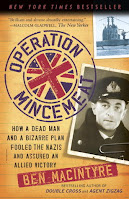“There are worse crimes than burning books. One of them is not reading them.”
– Ray Bradbury
My son started school last week. For one of his first English assignments he had to endure the obligatory “write about what you did last summer” exercise. Most of his summer consisted of sitting around playing Roblox, but he mentioned most of our various excursions (about which I recently blogged). Summer reading was, alas, conspicuously absent. His electronic-media-dominated generation rarely pays attention to books, preferring to stick their faces in screens all day long. That said, my son surprised me on a last-day-of-summer trip to the regional used bookstore, where he was particularly keen on getting a book he’d noticed on a previous visit: Operation Mincemeat by Ben Macintyre. It gave me a small glimmer of hope that his generation won’t completely forget about books.Frequent readers know how much I value books and the impact they’ve had on my life. I continue to find regular opportunities to read. At various points in my life I read during lunchtime. During the academic year I read every day while waiting in the school parking lot to pick up my son. I read while (infrequently) exercising on the stationary bike. I read about 20-30 minutes every night before bed.
I suppose when I was my son’s age and attending middle school (or “junior high” as it was known back then) I wasn’t much into recreational reading. Our school system heavily emphasized reading. Book fairs and clubs exposed us to the popular children’s print media of the time. Trips to the school library consisted of tedious orientations to research methods, source materials, and the now extinct card catalog. I recall (and still have) numerous novel adaptations of movies we saw; Alan Dean Foster’s novelization of Star Wars: A New Hope (“From the Adventures of Luke Skywalker”) was the first novel-length book I read. Eventually I immersed myself in Dungeons & Dragons (a reading adventure in itself) and the adventure gaming hobby and began reading some of the literature that inspired it, both fantasy and science fiction. The summer before my senior year in high school I ravenously read a book a week (sometimes two), purchased from the local bookstore, Books on the Common, whose owner Bob Silbernagel dutifully noted what I was reading and made sure to stock everything in a series or by a particular author (a feat in an age before computerized inventory and check-out). I’ve been a voracious reader ever since.As a parent I must accept my son is a different, independent person; we might share some interests, but he must find and pursue his own enthusiasms at his own pace and manner. So I try not to get too upset when he spends his summer with his head buried in Roblox. Still, I regret he doesn’t read more. No doubt teachers handed out lists of books to read over the summer to prepare for the next academic year, but that rarely inspired summertime reading (if noticed at all). I’ve long given up on enforcing summer reading activities. When he first learned to read (and even earlier) I made sure he attended the local public library’s summer reading programs: mostly age-appropriate story times with activities, with an occasional special event like the magic act, wildlife event, science show, and the infamous and blood-curdling “Snakes Alive” program (which I do not miss one bit), all geared in some distant way to encourage reading. He long ago tired of reading lists and logging one’s books to earn prizes (or in some cases the chance to win prizes) and tickets for ice cream events (a useless incentive for toddlers with allergies to eggs and milk). The gamification inherent in summer reading programs (a subject I’ve discussed before) sometimes discourages or even breeds apathy in participants.
So how do we gently pry our kids from their digital diversions to encourage them to explore books both analog and electronic? I look to games for some effective corollary. A game’s theme primarily attracts players, who let their enthusiasm for the topic temper the sometimes-frustrating experience of learning rules (though occasionally particular mechanics draw players who tolerate a theme). Likewise a book’s subject draws certain readers. As mentioned above, I really had no interest in reading until I saw Star Wars: A New Hope and – in that age without VCRs, DVDs, and streaming services – read the novel and comic books to immerse myself in my favorite media by whatever means I could. I’ve tried to share many of my varied interests with my son in different ways: we enjoy numerous genres of media as a family; we play a vast assortment of games; we take excursions to historical sites and museums. We’ve always encouraged him to have books, first when we read him stories before bedtime and later after he learned to read.
Most of the time he’s not too enthusiastic about any given book we get him; but every now and then he dives into something unexpected (though we take note). While he was immersing himself in Star Wars, Marvel, and Doctor Who show he read the shorter books we got him on the subjects. The more encyclopedic reference volumes – filled with photos – enabled him to skip around to things that interested him. One day I returned from the used bookstore with a thick illustrated history encyclopedia. He started exploring the entries that caught his interest. All this reading occasionally gave us something to talk about, or relate to things we saw or watched.
He’s certainly not the voracious reader I was in high school; but in this world of readily available immediate electronic entertainment and at this age when so many things vie for his attention, I’m just glad he occasionally finds something he enjoys reading. I’m not sure where he heard about Operation Mincemeat – though I enjoy sharing my interest in World War II – but I take heart he’s found something engaging enough to pick up and read a book about it. Here’s hoping that happens more often.
My Summer Reading List
If I’m going to complain about my son not reading much over the summer I should at least offer some proof I’ve been reading. Here are the books I read over the summer of 2022:
The Doolittle Raid by Carroll V. Glines: A pretty straightforward account of America’s first raid against Japan after Pearl Harbor, focusing on the men who flew the mission and their fates, the planning stages, and the effect it had on Japanese morale.
The Elric Saga by Michael Moorcock: I read these novels back in high school and thought they deserved another reading. It was quite a different experience, with the tone of inevitable doom resonating with our real-world current events.
The Epiphany Club by Andrew Knighton: A Kickstarter campaign for a roleplaying game adventure based on this collection of novellas caught my eye. The Victorian steampunk element intrigued me so I figured I’d read the source material.
The Cat Who Saved Books by Sosuke Natsukawa: A novel my wife picked up based on its gorgeous cover and the convergence of two interests...cats and books. A whimsical, sometimes allegorical story of a boy who explores the meaning of books, friendship, and his place in the world.
Uncle Ned’s Mountain by Jack Sanders: A deep dive into African-American history and culture in a sleepy New England town, including humbling accounts about enslaved people’s lives, suspected Underground Railroad activity, and the military service many rendered despite their struggles.
Ridgefield Names by Jack Sanders: A history of place and road names prominent in my the town in Connecticut where I grew up. While I haven’t read this cover-to-cover, I’ve spent hours wandering through it like I’m driving around my old hometown exploring roads I used to travel and places my friends used to live.
Flight of the Eagle and Raid on the Forth by Colin Maxwell: I backed the Kickstarter to print these two comic books about little-known episodes in World War II...the first about the escape of a Polish submarine and the second about the first German Luftwaffe raid against the United Kingdom. I’m not a huge comic book reader, but these caught my eye for their historical topics. And I’m always astounded (and relieved) our local public library stocks graphic novels and counts them as acceptable reading.
I’m currently reading two books about women in World War II: The Girls of Atomic City by Denise Kiernan (while exercising) and Code Girls by Liza Mundy (before bed). Invisible Ink by John A. Nagy is my current reading while waiting in the parking lot to pick my son up from school.
“Reading is the key to knowledge. Knowledge is the key to understanding. So read on, young man! Read on, young lady!”
– Mr. T



Glad your son liked Operation Mincemeat where the devil of the detail determined the deception and you can also enjoy checking it out with contemporaneous press cuttings etc. He might like another bizarre non-fiction espionage thriller called Beyond Enkription by Bill Fairclough. I've pasted a review here .......................... Beyond Enkription (intentionally misspelt) is a must read for espionage cognoscenti and the first stand-alone spy thriller in The Burlington Files autobiographical series by Bill Fairclough (MI6 codename JJ, aka Edward Burlington). It’s a raw and noir matter of fact pacy novel that Len Deighton and Mick Herron could be forgiven for thinking they co-wrote. Coincidentally, a few critics have nicknamed its protagonist, Bill Fairclough aka Edward Burlington, “a posh Harry Palmer.”
ReplyDeleteThis elusive and enigmatic novel is a true story about a maverick accountant (Edward Burlington in Porter Williams International aka Bill Fairclough in Coopers & Lybrand in real life). In 1974 in London he began infiltrating organised crime gangs, unwittingly working for MI6. After some frenetic attempts on his life he was relocated to the Caribbean where, “eyes wide open” he's recruited by the CIA and is soon headed for shark infested waters off Haiti.
If you’re an espionage cognoscente you’ll love this monumental book but just because you think you know it all don’t surf through the prologue: you may miss some disinformation. If you felt squeamish when watching Jaws, you may find the savagery of the opening chapter upsetting, but it soon passes.
This epic is so real it made us wonder why bother reading espionage fiction when facts are so much more exhilarating. Atmospherically it's reminiscent of Ted Lewis' Get Carter of Michael Caine fame. If anyone ever makes a film based on Beyond Enkription they'll only have themselves to blame if it doesn't go down in history as a classic thriller … it’s the stuff memorable films are made of.
Whether you’re a le Carré connoisseur, a Deighton disciple, a Fleming fanatic, a Herron hireling or a Macintyre marauder, odds on once you are immersed in it you’ll read this titanic production twice.
For more detailed reviews visit the Reviews page on TheBurlingtonFiles.org website or see other independent reviews on your local Amazon website and check out Bill Fairclough's background at Everipedia.org.